Compact Unit
Emancipation Proclamation Day and Juneteenth
Friday, January 1, 2011
Guest Writer for this Unit: Mark Jefferson. Mark is a first-year PhD student at Emory University in Atlanta, GA.
The unit you are viewing, Emancipation Proclamation Day and Juneteenth, is a compact unit. This means that it does not have a supporting cultural resource unit and worship unit. Instead, to enliven the imagination of preachers and teachers, we have provided scriptural text(s) that we suggest for this moment on the calendar along with a sermonic outline, suggested links, books, articles, songs, and videos. For additional information see Emancipation Proclamation Day and Juneteenth in the archives of the Lectionary for 2008, 2009, and 2010. 2011 is the first year that the African American Lectionary has posted compact units for moments on its liturgical calendar.
I. Description of the Liturgical Moment
Since the signing of the Emancipation Proclamation and Juneteenth share important historical and cultural connections, we explore them under the same lectionary moment. Some congregations will choose to celebrate each of these moments separately on different days. Others will elect to celebrate only one of these moments. Still other churches will combine the celebrations as we have done and celebrate them on January 1st or June 19th.
In the African American Lectionary 2010 Emancipation Proclamation Day commentary, Dr. Luke Powery wrote the following concerning the theological implications of designating a day Emancipation Proclamation Day:
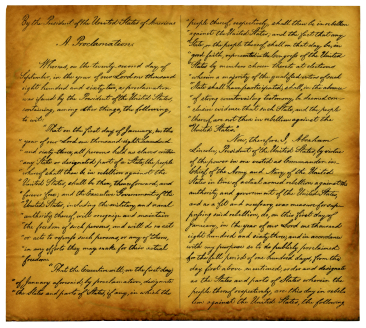 To designate a day “Emancipation Proclamation” implies that God is a God of emancipation, freedom, and liberation. It suggests that God is on the side of freedom and resists oppression. This is surely true for the black church’s traditional understanding of God as a God who is on the side of the oppressed. The God of black people is a freeing God. By making this distinction (i.e., God of black people), I am suggesting that there may be other gods, even supposedly “Christian gods,” at work in the world; other gods whom people worship, other gods whom people think are God. But, if these gods are oppressive and destructive, they are not the God of the oppressed, the God of African Americans, the God of our weary years and silent tears, the One who has brought us thus far along the way. This identity of God as a deliverer of the oppressed is critical for this Sunday and is a lens through which one can worship in celebration with trust in his or her heart.
To designate a day “Emancipation Proclamation” implies that God is a God of emancipation, freedom, and liberation. It suggests that God is on the side of freedom and resists oppression. This is surely true for the black church’s traditional understanding of God as a God who is on the side of the oppressed. The God of black people is a freeing God. By making this distinction (i.e., God of black people), I am suggesting that there may be other gods, even supposedly “Christian gods,” at work in the world; other gods whom people worship, other gods whom people think are God. But, if these gods are oppressive and destructive, they are not the God of the oppressed, the God of African Americans, the God of our weary years and silent tears, the One who has brought us thus far along the way. This identity of God as a deliverer of the oppressed is critical for this Sunday and is a lens through which one can worship in celebration with trust in his or her heart.
In the African American Lectionary 2009 Emancipation Proclamation and Juneteenth cultural resource unit, Dr. Juan Floyd-Thomas wrote the following about the history of Juneteenth:
June 19th is perhaps the oldest holiday celebrated by African Americans; it is the grandfather of all such observances. Juneteenth is a cultural observance. June 19, 1865 marks the date that all slaves in the United States were officially made “free.”
Freed slaves in the state of Texas created and developed the June 19th celebration in 1866. Legend has it that the name Juneteenth was derived from a little Negro girl who could not pronounce “June 19.” She said “Juneteenth” and the name caught on and was used throughout the state of the Texas.
Juneteenth is officially observed on June 19; however, the celebration may last one to seven days. On this Lectionary, it is slated for celebration for January 1 and has been joined with Emancipation Proclamation Day for two reasons. First, the Emancipation Proclamation was given effect on January 1, 1863. Second, during the earliest Juneteenth celebrations the reading of the Emancipation Proclamation took center stage. Our goal is to give historical coverage to both events, understanding that Juneteenth is now almost always celebrated in June.
This American holiday is celebrated primarily by African Americans and was originally celebrated by freed slaves located in the state of Texas. Juneteenth is now celebrated by many throughout the world.
Juneteenth is observed to acknowledge that all slaves within the continental United States were freed at a certain point. This celebration acknowledged the signing of the Emancipation Proclamation while also acknowledging that the slaves of the state of Texas did not receive the news until almost 2½ years after the official signing and announcement was given. Large celebrations began in 1866.
With this background material in mind, we now turn to the sermon outline.
II. Emancipation Proclamation and Juneteenth: Sermonic Outline
A. Sermonic Focus Text(s): Isaiah 61:1-11 and 2 Corinthians 3:17 (New Revised Standard Version)
Isaiah 61:1-11
(v. 1) The spirit of the Lord God is upon me, because the Lord has anointed me; he has sent me to bring good news to the oppressed, to bind up the brokenhearted, to proclaim liberty to the captives, and release to the prisoners; (v. 2) to proclaim the year of the Lord’s favor, and the day of vengeance of our God; to comfort all who mourn; (v. 3) to provide for those who mourn in Zion—to give them a garland instead of ashes, the oil of gladness instead of mourning, the mantle of praise instead of a faint spirit. They will be called oaks of righteousness, the planting of the Lord, to display his glory. (v. 4) They shall build up the ancient ruins, they shall raise up the former devastations; they shall repair the ruined cities, the devastations of many generations. (v. 5) Strangers shall stand and feed your flocks, foreigners shall till your land and dress your vines; (v. 6) but you shall be called priests of the Lord, you shall be named ministers of our God; you shall enjoy the wealth of the nations, and in their riches you shall glory. (v. 7) Because their shame was double, and dishonor was proclaimed as their lot, therefore they shall possess a double portion; everlasting joy shall be theirs. (v. 8) For I the Lord love justice, I hate robbery and wrongdoing; I will faithfully give them their recompense, and I will make an everlasting covenant with them. (v. 9) Their descendants shall be known among the nations, and their offspring among the peoples; all who see them shall acknowledge that they are a people whom the Lord has blessed. (v. 10) I will greatly rejoice in the Lord, my whole being shall exult in my God; for he has clothed me with the garments of salvation, he has covered me with the robe of righteousness, as a bridegroom decks himself with a garland, and as a bride adorns herself with her jewels. (v. 11) For as the earth brings forth its shoots, and as a garden causes what is sown in it to spring up, so the Lord God will cause righteousness and praise to spring up before all the nations.
2 Corinthians 3:17
Now the Lord is the Spirit, and where the Spirit of the Lord is, there is freedom.
B. Possible Titles
C. Point of Exegetical Inquiry
In any text there can be several significant points of exegetical inquiry. Given that the day on the calendar is Emancipation Proclamation and Juneteenth, I believe that the point in the text that deserves special exegetical inquiry is Isaiah 61:5:
(v. 5) Strangers shall stand and feed your flocks, foreigners shall till your land and dress your vines;
Strangers—the Hebrew word zuwr means to be a stranger or to be strange. This differs from the word foreigners in the text. The word for foreigners in the text—ben—refers to a people of a nation. This exegetical inquiry helped to make clear to me how God enlists people who are different from the Israelites and people of a different nation altogether to bless Israel.
III. Introduction
Forty acres and a mule was supposed to be the resources granted to every slave to help them transition from slave to free person. We realize that our ancestors did not get their forty acres and a mule but were mainly the recipients of one empty promise after another. However, there were those who knew that freedom for slaves must be supported by resources, because any group that had had most basic resources withheld needed help making the adjustment to full citizenship, and all rights and privileges attendant thereto.
We, as Christians, also understand what it means to be bound (to be constrained in different ways). Just as was the case with those who enslaved our foreparents, many of us were/are bound by pride, power, anger, greed, cold and unfeeling hearts, etcetera. God can set us free from all shackles, and we see God as an emancipator and one who gives reparations in Isaiah 61.
IV. Moves/Points
V. Celebration
An old song, “His Eye Is on the Sparrow,” says, “I sing because I’m happy, I sing because I’m free; For His eye is on the sparrow, And I know He watches me!” So, I embrace my freedom. I sing because I’m happy. I sing because I’m free!
VI. Illustration(s)
2 Corinthians 3:17 says, “Now the Lord is the Spirit, and where the Spirit of the Lord is, there is freedom.” Many of us don’t recognize our freedom even when we stare it in the face. There was a man who was captured by an enemy army. They placed him in a dungeon with little light and little food. They would always open his cell and feed him. And then the feeding stopped. And every day he prayed that God would make a way for him to escape. After many weeks, he gave up hope. Just then, the war ended and troops came to rescue him. They asked, “Why are you still sitting in here?” He said, “I am prisoner; they locked me in here a long time ago.” A soldier said, “You must not have tried to open the gate because the lock on this gate is broken. You could have just walked to freedom.”
See the Sermon Illustration section of the African American Lectionary for additional illustrations that you may wish to use in presenting this sermon.
VII. Songs to Accompany This Sermon
A. Hymn(s)
- O God, Our Help in Ages Past. By Isaac Watts. Arr. by William Croft. Tune, (ST. ANNE).
This hymn originated in the 18th century and is based on Psalm 90. It reminds the church of “help” in the past, “shelter” in the present, and our “hope” for the future. Given this text, this song can be used an opening hymn.
B. Well-known Song(s)
- Don’t You Let Nobody Turn You ‘Round. Arr. by Lena I. McLin
This song can be used during the Period of Prayer. Its message tells hearers to keep fighting because there are still injustices that need to be overcome.
C. Modern Song(s) (Written between 2005–2010)
- I’m Coming Out. Sung by Dorinda Clark-Cole
This song can be used at any point in the worship service as an assertion by worshippers that they are claiming their ability to overcome anything that has them bound.
- For Every Mountain. Sung by Curt Karr and the Brooklyn Tabernacle Choir.
 accessed 5 December 2010.
accessed 5 December 2010.
This song can be used at any point in the worship service except as the sermonic hymn or the invitational hymn. It encourages believers to praise God or give thanks for everything, including the mountains we encounter.
D. Invitational Song(s)
- We Shall Overcome. Text adapted by Zilpha Horton, Frank Hamilton, Guy Carawan, and Pete Seeger. Tune, (WE SHALL OVERCOME).
This song affirms what ought to be the resolve of all black Christians, is apt for Emancipation Proclamation and Juneteenth, and sums up the main point of the sermon—that with God, Christians shall overcome as they continue to battle for the Kingdom. This song is also selected as the Invitational Song because it beckons the unsaved to come forth and overcome by accepting Christ and beckons believers to be resolved to do the work of God instead of just talk about it.
VIII. Videos, Audio, and or Interactive Media
- “Lincoln’s Proclamation.” National Geographic. Online location: http://www.youtube.com/watch?v=akfQ7TfAQVY accessed 5 December 2010
- Bailey, Jim. Dir. Juneteenth—A Celebration of Freedom (Trailer). Texas Institute for the Preservation of History and Culture. Contact Information: http://www.pvamu.edu/pages/5069.asp
Online location for videos:
Part I: http://www.youtube.com/watch?v=fkI5ricZGLQ&feature=channel
Part II: http://www.youtube.com/watch?v=zFDUIu5ri-Y&feature=channel
Part III: http://www.youtube.com/watch?v=6qJ96ZlV0qk&feature=channel
accessed 5 December 2010
- “This Far by Faith.” See the outline of this 6-part documentary. Online location: http://www.pbs.org/thisfarbyfaith/about/the_series.html accessed 5 December 2010
- The Slave Experience: Personal narratives from former slaves about religion. Audio and text. Slavery and the Making of America. PBS. Online location: http://www.pbs.org/wnet/slavery/experience/religion/narratives.html accessed 5 December 2010
- “Isaiah 61—AIS Hope Academy Drakenstein Prison, Cape Town, South Africa.” Theme of renewal, restoration and rebuilding youth with soccer/sport. Online location: http://www.youtube.com/watch?v=2cvWR5guYc0 accessed 5 December 2010
- Interactive: “The Underground Railroad.” National Geographic. Online location: http://www.nationalgeographic.com/features/99/railroad/index.html accessed 5 December 2010
IX. Books, Commentaries, and Articles and to Assist in Preparing Sermons or Bible Studies
A. Books
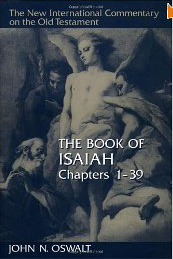 |
|
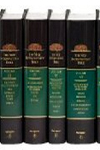 |
|
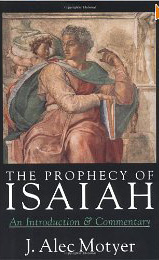 |
|
B. Articles
- “A Story of Loss and Hope.” A Commentary on Isaiah. Brueggemann, Walter. Sojournors Magazine 27.6 (Nov–Dec 1998):44-48. Online location: https://www.sojo.net/index.cfm?action=magazine.article&mode=author&authorid=362&issue=soj9811&article=981149 accessed 5 December 2010
C. Books and Writings Concerning Emancipation Proclamation Day and Juneteenth
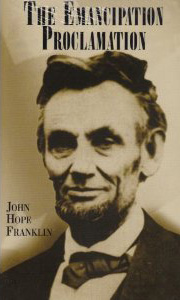 |
|
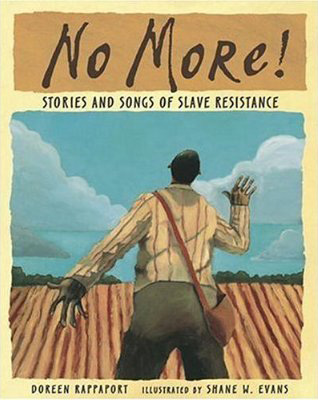 |
|
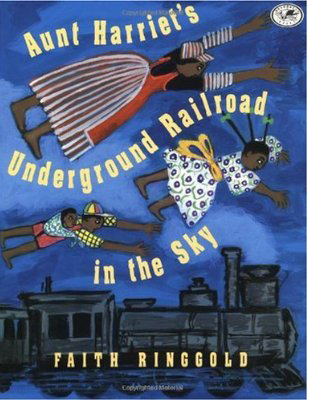 |
|
 |
|
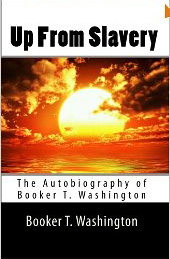 |
|
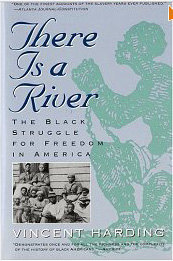 |
|
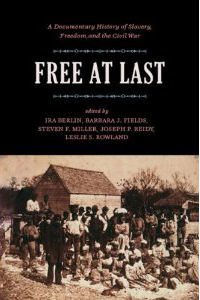 |
|
- “Who Freed the Slaves? Emancipation and Its Meaning in American Life.” Berlin, Ira. Maryland. Online location: www.library.vanderbilt.edu/Quaderno/Quaderno5/Q5.C3.Berlin.pdf accessed 5 December 2010. (“From the first guns at Fort Sumter, the strongest advocates of emancipation were the slaves themselves.”)
- Check your local library for a selection of books for all ages. For suggestions, go to: http://www.pbs.org/wnet/slavery/resources/kids.html accessed 5 December 2010
X. Links to Helpful Websites for Emancipation Proclamation and Juneteenth
- The “Emancipation Proclamation.” National Archives & Records Administration. Online location: http://www.archives.gov/exhibits/featured_documents/emancipation_proclamation/ accessed 5 December 2010
- “Ex-Slave Narratives.” C-Span. Audio interviews of former slaves. Online location: http://www.c-span.org/antietam/narratives.asp accessed 5 December 2010
- Juneteenth World Wide.Com. Information on the location of Juneteenth celebrations and its history. Online location: http://www.juneteenth.com/ accessed 5 December 2010
- The “Annual Juneteenth Jamboree” is a celebration of new works by African American playwrights about the African American experience. Juneteenth Legacy Theatre. Louisville, KY. Online location: http://www.juneteenthlegacytheatre.com/index.html accessed 5 December 2010
- Acosta, Teresa Palomo. “Juneteenth.” A short historical timeline of Juneteenth’s evolution. Handbook of Texas Online. Online location: http://www.tshaonline.org/handbook/online/articles/lkj01 accessed 5 December 2010
- The Slave Experience: Religion. PBS has many sources of information which can inspire discussion and sermons for all ages and all levels of education. Click on the links. Online location: http://www.pbs.org/wnet/slavery/experience/religion/index.html accessed 5 December 2010



